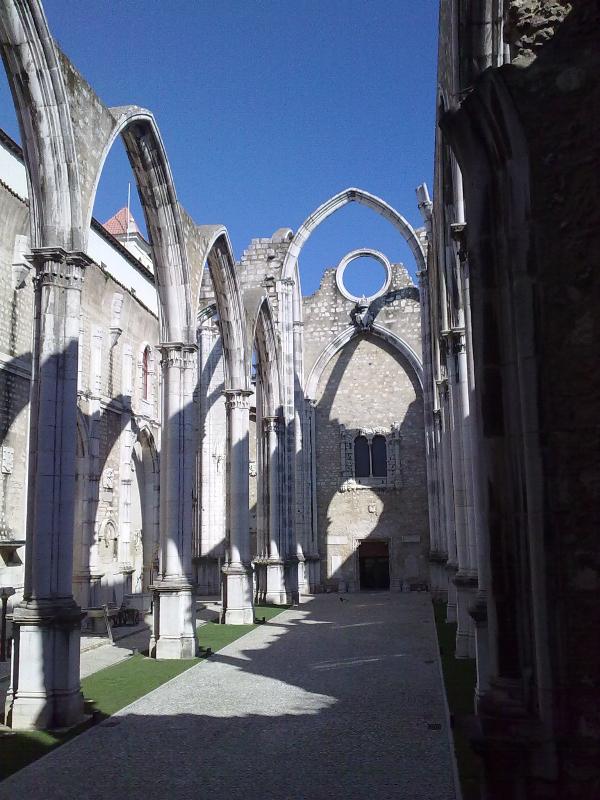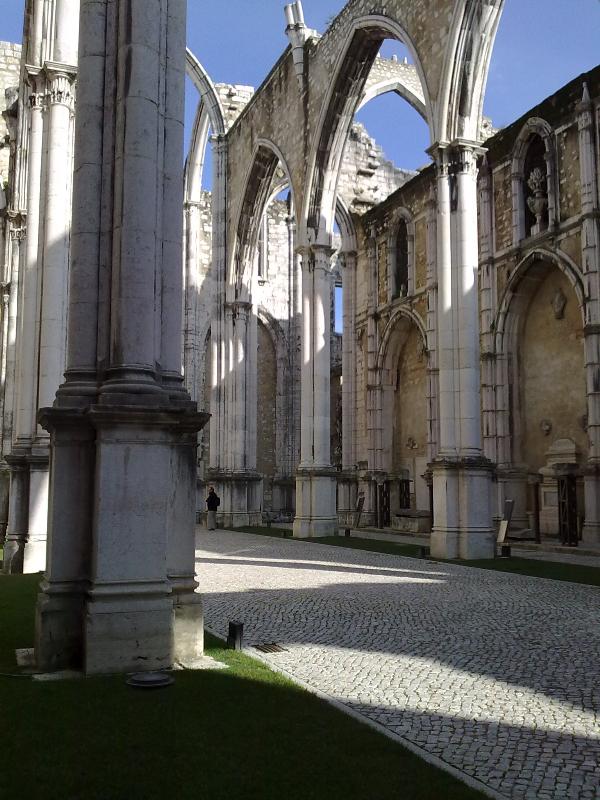Convento
doCarmo

PT
O Convento do Carmo foi fundado por D. Nuno Álvares Pereira em
1389. Foi ocupado inicialmente por frades carmelitas de Moura,
chamados por D. Nuno para ingressar no convento em 1392. Em 1404,
D. Nuno doou os seus bens ao convento e, em 1423, ele mesmo
ingressou no convento como religioso. O convento e a igreja foram
erguidos aproximadamente entre 1389 e 1423 em estilo gótico
mendicante, com certa influência do estaleiro do Mosteiro da
Batalha, que havia sido fundado por D. João I e que também estava
em construção à época. No dia 1 de Novembro de 1755, o grande
terramoto destruiu boa parte da igreja e do convento, que nunca
chegou a ser totalmente reconstruído. No reinado de D. Maria I
iniciou-se a reconstrução de uma ala do convento, sem respeito pelo
estilo ou a traça originais, que foi ocupado pelos monges até à
expulsão das ordens religiosas, em 1834, e convertido em
instalações militares em 1836. A igreja permaneceu em ruínas até à
actualidade. Foi no Quartel do Carmo, sede do Comando-Geral da GNR,
que o Presidente do Conselho do Estado Novo, Marcelo Caetano, se
refugiou dos militares revoltosos, durante a Revolução dos Cravos.
O cerco deste aquartelamento foi dirigido pelo capitão Salgueiro
Maia. No Largo do Carmo, em frente ao convento, encontra-se o
Chafariz do Carmo, do século XVIII, desenhado por Ângelo Belasco e
decorado com quatro golfinhos.
Horário de Funcionamento:
Segunda a Sábado - 10h às 18h
Encerra aos Domingos, Ano Novo, Páscoa, 1º de maio e Natal
Preçário:
Bilhete Normal - 3.50€
Lisboa Card - 2.80€
Estudantes - 2.00€
Maiores de 65 anos e Reformados - 2.00€
Menores de 14 anos - Gratuito
Fonte: Wikipedia
A Cache:
As coordenadas publicadas são da entrada do convento.
A cache encontra-se fora do convento, e para chegarem até ela
existem duas formas.
A primeira é visitar o convento e responder às seguintes
perguntas:
A - Arcossólico Manuelino e Túmulo de um Cavaleiro
- Séc. XVI - 7
- Séc. XVII - 8
- Séc. XVIII - 9
B - Pedra de Armas de Cabedo, Vasconde e Almeida
- Séc. XVI - 6
- Séc. XVII - 7
- Séc. XVIII - 8
C - Cruzeiro Manuelino
- Séc. XVI - 1
- Séc. XVII - 2
- Séc. XVIII - 3
D - Poço
- Séc. XVI-XVII - 3
- Séc. XVII-XVIII - 4
- Séc. XVIII-XIX - 5
E - Base de Púlpito
- Séc. XVI - 7
- Séc. XVII - 8
- Séc. XVIII - 9
F - Lápide com Brasão da Cidade de Lisboa
- Séc. XVIII - 7
- Séc. XIX - 8
- Séc. XX - 9
As coordenadas finais São:
N 38° 42.ABC W 009° 08.DEF
Para quem não quiser visitar o convento existe a segunda
possibilidade, em que é necessário ver qual a data mais recente que
está na placa do lado direito da fachada do convento. É necessário
saber numeração romana. Vão obter um numero com quatro dígitos
(ABCD).
As coordenadas finais São:
N 38° 42.(C)(B)(A) W 009° 08.(B/2)(D)(B)
Tragam material de escrita.
A recepção de GPS no local é bastante fraca, é normal que as
coordenadas não estejam precisas.

EN
The Carmo Convent was founded as a convent for the Carmelite
Order in 1389 by the Portuguese knight Nuno Álvares Pereira.
Álvares Pereira was Constable of Portugal, meaning that he was the
supreme military commander after the King. At the service of King
John I, Álvares Pereira commanded the Portuguese army in the
decisive Battle of Aljubarrota (1385), in which the Portuguese
guaranteed their independence by defeating the Castilian army. The
Carmo Convent was initially inhabited by Carmelites from Moura
(southern Portugal), which entered the convent in 1392. In 1404,
the pious Álvares Pereira donated his wealth to the convent and, in
1423, he also became a brother of the convent. On November 1, 1755,
the great earthquake destroyed most of the convent and its church.
The Convent library and its 5000 books were all lost. The convent
was remodelled and eventually became a military quarter. The church
was never fully rebuilt and, after a period as wood storage house,
it was donated in 1864 to the Association of Portuguese
Archaeologists, which turned the ruined building into a museum. In
the 20th century, during the Carnation Revolution, the Carmo
Headquarters was the last stronghold of the Presidente of the
Estado Novo, Marcelo Caetano, and the military loyal to him. The
old Carmo Convent building is now used by the Municipal Guard
(Guarda Republicana).
Opening Hours:
Monday to Saturday - 10am - 6pm
Closed at Sundays, New Year, Easter, 1st of May and Christmas
Admission Fee:
Normal Ticket - 3.50€
Lisboa Card - 2.80€
Students - 2.00€
Over 65 years and Retired - 2.00€
Less than 14 years old - Free
Source: Wikipedia
The Cache:
The published coordinates are from the entrance of the
Convent.
The cache is outside of the Convent. There's two ways to get
there.
The first is to visit the Convent as answer to the next
questions:
A - Manueline Arcosolia and Tamb of a Knight
- 16th Cent. - 7
- 17th Cent. - 8
- 18th Cent. - 9
B - Cabedo, Vasconcelos and Almeida Family's of Arms
- 16th Cent. - 6
- 17th Cent. - 7
- 18th Cent. - 8
C - Manueline Cross
- 16th Cent. - 1
- 17th Cent. - 2
- 18th Cent. - 3
D - Well
- 16th - 17th Cent. - 3
- 17th - 18th Cent. - 4
- 18th - 19th Cent. - 5
E - Pulpit Base
- 16th Cent. - 7
- 17th Cent. - 8
- 18th Cent. - 9
F - Inscription with Lisbon Arms
- 18th Cent. - 7
- 19th Cent. - 8
- 20th Cent. - 9
The final coordinates are:
N 38° 42.ABC W 009° 08.DEF
For the people who don't want to visit the Convent, there's a
second way to do the cache, which is necessary to see the most
recent date in the plate on the right side of the convent. It's
necessary to have knowledge of Roman Numerals. You'll get a number
with 4 digits (ABCD).
The final coordinates are:
N 38° 42.(C)(B)(A) W 009° 08.(B/2)(D)(B)
Bring your own writing material.
The GPS reception is very week, so it's normal that the coordinates
aren't quite in the right place.